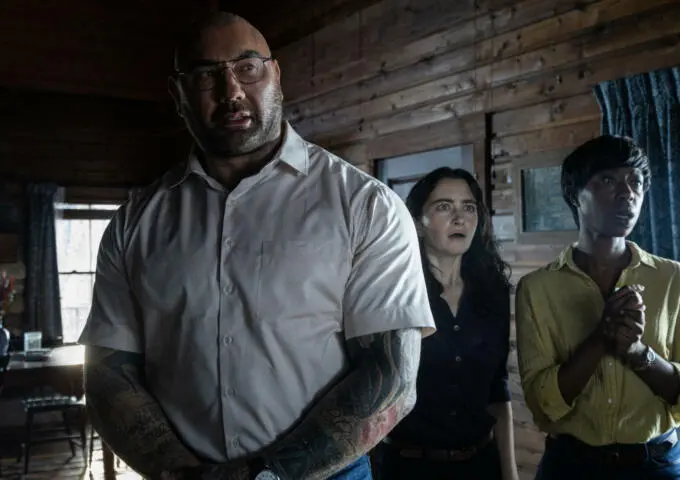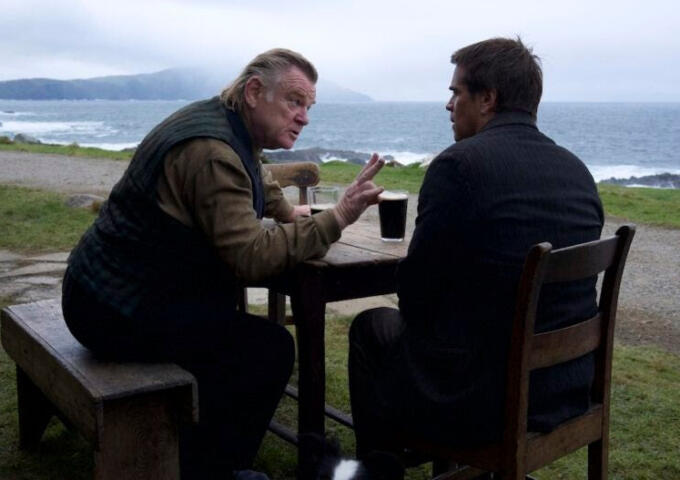With the Venice and Toronto Film Festivals both handily out of the way within the last few weeks, and autumn release slates pretty much sealed, it’s important to note that, atop both lists of cinematic feast, have been movies based on family dynamics and how dysfunction rules the roost.
What’s better than a Christmas time release for White Noise, a Noah Baumbach film starring Adam Driver (the same team that brought us Marriage Story) from Don DeLillo’s apocalyptic novel about a professor-father teaching Hitler studies at a local college trying to steer his brood through a chemical waste disaster that threatens their existence? Do you think December’s lead-off, Guillermo del Toro’s Pinocchio at Netflix about an old man and his puppet son come to life doesn’t come with horrific family consequences, at least if you’ve been paying attention to del Toro’s catalog of fright including Nightmare Alley and his Hellboy series. And don’t believe for one second that Stephen Spielberg’s autobiographical The Fabelmans with Paul Dano, Michelle Williams and Seth Rogen coming out in time for Thanksgiving is a cakewalk. It’s about a family who let’s their kid fall in love with movies and pick up a camera. Hey, I was that kid. It’s nothing but frustration, bad ideas and costly lab bills.
No matter. The dysfunctional family film is big bank. Like movies that exist as part of the MCU and those starring able-bodied white people as impaired citizens, there is always wads of cash to be made by troubled moms, dads, aunts and uncles with even more troubling kids.
Here is a list of some of my favorite dysfunctional family films. Some might not seem like obvious choices to you, but like true dysfunction, it’s not always the hurt that shows that is the bloodiest or most terrible predicament.
The Royal Tenenbaums (2001)
Cinematic auteur Wes Anderson has a penchant for fucked-up family dynamics what with the estranged brothers of The Darjeeling Limited. Nothing compares, however, to the clutch of badly-dressed and ill-behaved eccentrics that make up Royal and Etheline Tenenbaum’s brood. Not a nice apple in the bunch. Plus, Gwyneth Paltrow.
Running with Scissors (2006)
Before Ryan Murphy decided that pretty much most everything he did had to be terrible (the last few seasons of American Horror Story, the new Dahmer) or stupid (Hollywood, Ratched) the director-producer-writer made a film with Succession’s Brian Cox about a deeply alcoholic father and a weirdly unstable mother foisting their wounded child off to an even goofier therapist for the entirety of the kid’s adolescence. Plus, Gwyneth Paltrow. (Murphy is good with dysfunctional families around Gwyneth Paltrow when you consider the mess of The Politician, her flighty mom role and her spoiled brat son (played by spoiled Ben Platt) getting upset anytime a political race doesn’t go his way).
Extra credit Gwyneth Paltrow dysfunctional flick: Sylvia (2003) where she plays suicidal-from-the-start poet Sylvia Plath.
Citizen Kane (1941)
Once Orson Welles’ Charles Foster Kane drops that snow globe and utters his fatal, final last words (“Rosebud”), it’s nothing but a mean dad, a disregarding mother, a lousy marriage and an affair gone wrong.
Cape Fear (1991)
You’re Juliette Lewis and your always-at-odds parents are Nick Nolte (before the wiry, homeless-haired look) and Jessica Lange. A muscled, tattooed, psalm-quoting, Southern-accented Robert DeNiro is sucking on your thumb, biting people’s faces off, and the only decent person in the whole film is Robert Mitchum. What could go wrong?
Home Alone (1990)
Fun is fun, but what sort of blindly ignorant extended family – moms, dads, uncles, brothers and sisters – leave an eight-year-old home, alone, to deal with Joe Pesci, the very same year he plays a scary, psychotic Mob killer in Goodfella. The same exact year. Then, the whole family does it again to the poor kid for at least one more film that I could handle. That’s fucked up.
Crazy Rich Asians (2018)
Every dysfunctional family member in director Jon M. Chu’s comedy is more selfish and money-hungry than the next. Thankfully, they all look and dress sensationally so you almost never notice just how broken they all are.
The Fighter (2010)
The boxing brother genre has a long wiry history that, at its saddest, goes back to On the Waterfront, 1954’s crime classic, directed by Elia Kazan, written by Budd Schulberg and starring Marlon Brando and Rod Steiger as the brothers Malloy – the first of which is a punch-drunk loser boxer forced to take dives by his chiseling bad guy brah, hence the line “I coulda been a contender, instead of a bum, which is what I am.” David O. Russell’s 21st Century film takes the winning-losing troubled boxing brother dynamic, makes them both boxers, but makes Christian Bale really skinny (not The Mechanist skinny, but still), gives him this hardcore, impossible-to-understand Bahhhstaahhn accent and his whole film so dark you can barely make out what’s going on. Who knows? Maybe this isn’t so dysfunctional.
Death at a Funeral (also 2010)
Neil LaBute is the king of caustic dysfunctional dialogue (In the Company of Men and Nurse Betty, but no no, not his new American Gigolo remake), so bringing together Chris Rock (before the Will Smith slap) and Martin Lawrence (after the Will Smith slap) as battling brothers in a dark slapstick comedy about an at-odds family at a funeral: laughs ensue.
The Ref (1994)
American Beauty (1999)
Since we’re not allowed to talk about Kevin Spacey anymore, I’ll make this brief: in the 1990s, Spacey made for one-hell-of-a-prick husband and lousy, ignorant dad with dysfunction everywhere to be seen. For director Ted Demme with Judy Davis, he was a nasty bickering creep husband who gets upended by burglar Denis Leary. For Sam Mendes and American Beauty, Spacey goes all-out mid-life crisis, becomes weirdly infatuated with his daughter’s bestie, and shot in the face for rejecting his male neighbor’s romantic gestures. If we throw in his roles in The Usual Suspects, Se7en and Swimming with Sharks, Midnight in the Garden of Good and Evil and Glengarry Glen Ross, Spacey all-but owns dramatic 90s dysfunction.
Us (2019)
How better to portray dysfunction than for scary move man Jordan Peele to create a loving, nuclear family, their mean exact doubling doppelgängers, kill of the lady in The Handmaid’s Tale, and use the Hands Over America theme?
The Squid and the Whale (2005)
Just the thought of Noah Baumbach, Jeff Daniels and Laura Linney in a film about divorce, and 1980s Brooklyn before gentrification brings a tear to my eye.
The Meyerowitz Stories (2017)
Is it me or should I just have put “Noah Baumbach” into a Google search, and let the dysfunction roll? This time, again, in New York, the director gathers up way-estranged bickering brothers – the money-making slick one, Ben Stiller and the slobbish loser, Adam Sandler – to celebrate the artistic catalog of their egotistical, swanning-around father Dustin Hoffman. What’s really effective about these “Stories” is how much like a family the actors look and sound like. I should have put this higher on the list, but it’s just too sad and uncomfortable.
Bad Moms (2016)
This one is too easy: a handful of attractive mom-women (Mila Kunis, Kristen Bell, Christina Applegate, Kathryn Hahn) ditch their families to have many laughs and spend money they don’t have. Then they rubbed their families’ collective noses in their own greed and dysfunction in time for the holidays ala A Bad Moms Christmas (2017). That is bad.
Throw Momma from the Train (1987), The War of the Roses (1989), Matilda (1996)
The Danny DeVito directorial dysfunction trifecta finds him trying to kill his mom, finds bitter, bloody-thirsty spouses dying to kill each other, and a clairvoyant child finding unusual ways to taunt her horrible parents.
It’s a Wonderful Life (1946)
The ultimate dysfunctional family film – a good guy (played by Hollywood’s ultimate Everyman, Jimmy Stewart) with a great family, but middling money troubles seeks to get away from it all and find a world where he’s never existed. That’s some irresponsible bullshit. Imagine if every time your savings and loans went down, you bolted. Bah, humbug, man.





